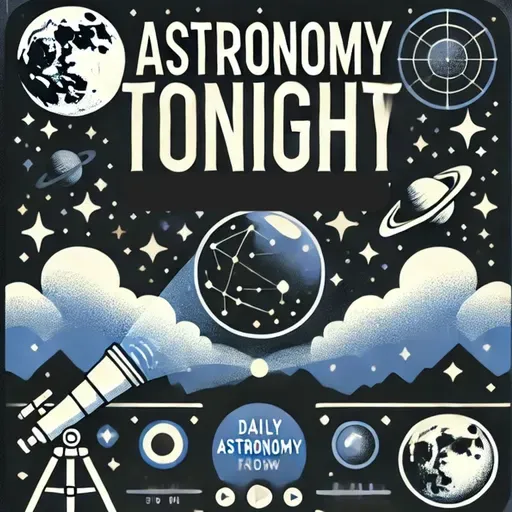
About
This is your Astronomy Tonight podcast.
On this day, September 1st, in the year 2054, astronomers at the newly established Lunar Observatory made a groundbreaking discovery that sent shockwaves through the scientific community. Using the state-of-the-art quantum-entangled telescope array, they detected an unusual radio signal emanating from the vicinity of Proxima Centauri b, the closest known exoplanet to Earth.
The signal, which repeated every 1.37 Earth days, bore striking similarities to the infamous "Wow!" signal detected back in 1977. However, this time, the signal persisted and grew stronger over a period of several weeks. Initial analysis suggested that the signal contained complex mathematical sequences that couldn't be explained by natural phenomena.
As news of the discovery spread, governments around the world scrambled to allocate resources for further investigation. The United Nations hastily convened an emergency session to discuss the potential implications of first contact with an extraterrestrial civilization.
Meanwhile, amateur astronomers worldwide pointed their telescopes towards Proxima Centauri, hoping to catch a glimpse of any unusual activity. Social media platforms were flooded with theories, ranging from the plausible to the wildly speculative.
In an unprecedented move, a consortium of private space companies announced plans to fast-track the development of an interstellar probe to investigate the source of the signal up close. The project, dubbed "Proxima Pioneer," aimed to launch within the next decade, potentially revolutionizing our understanding of the cosmos and our place in it.
As we reflect on this monumental discovery from the future, we're reminded of the endless possibilities that await us in the vast expanse of space. Who knows what other secrets the universe holds, waiting to be uncovered by curious minds and advanced technology?
Don't forget to subscribe to the Astronomy Tonight podcast to stay up-to-date with the latest celestial happenings and mind-bending discoveries. If you want more information on this and other fascinating topics, check out QuietPlease.AI. Thank you for listening to another Quiet Please Production.
On this day, September 1st, in the year 2054, astronomers at the newly established Lunar Observatory made a groundbreaking discovery that sent shockwaves through the scientific community. Using the state-of-the-art quantum-entangled telescope array, they detected an unusual radio signal emanating from the vicinity of Proxima Centauri b, the closest known exoplanet to Earth.
The signal, which repeated every 1.37 Earth days, bore striking similarities to the infamous "Wow!" signal detected back in 1977. However, this time, the signal persisted and grew stronger over a period of several weeks. Initial analysis suggested that the signal contained complex mathematical sequences that couldn't be explained by natural phenomena.
As news of the discovery spread, governments around the world scrambled to allocate resources for further investigation. The United Nations hastily convened an emergency session to discuss the potential implications of first contact with an extraterrestrial civilization.
Meanwhile, amateur astronomers worldwide pointed their telescopes towards Proxima Centauri, hoping to catch a glimpse of any unusual activity. Social media platforms were flooded with theories, ranging from the plausible to the wildly speculative.
In an unprecedented move, a consortium of private space companies announced plans to fast-track the development of an interstellar probe to investigate the source of the signal up close. The project, dubbed "Proxima Pioneer," aimed to launch within the next decade, potentially revolutionizing our understanding of the cosmos and our place in it.
As we reflect on this monumental discovery from the future, we're reminded of the endless possibilities that await us in the vast expanse of space. Who knows what other secrets the universe holds, waiting to be uncovered by curious minds and advanced technology?
Don't forget to subscribe to the Astronomy Tonight podcast to stay up-to-date with the latest celestial happenings and mind-bending discoveries. If you want more information on this and other fascinating topics, check out QuietPlease.AI. Thank you for listening to another Quiet Please Production.